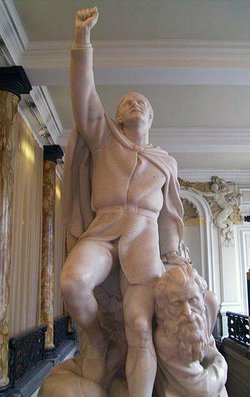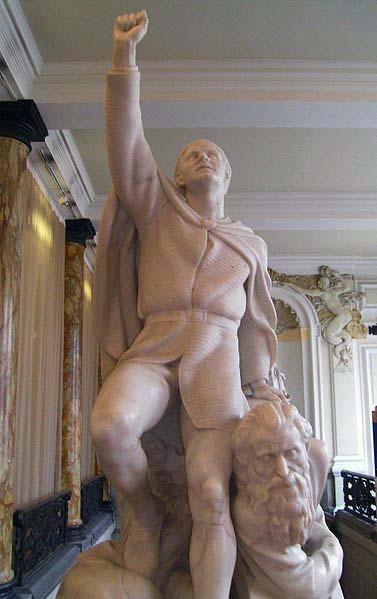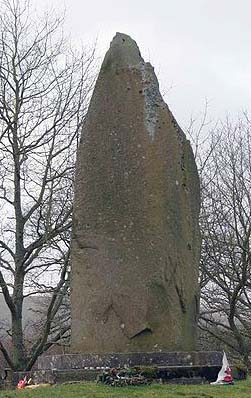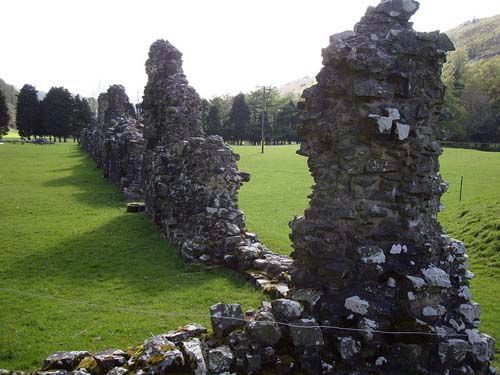Llywelyn was the second of the four sons of Gruffydd, the eldest son of Llywelyn the Great, and Senena ferch Rhodri. Llywelyn older brothers were Owain Goch ap Gruffydd and Llywelyn had his two younger brothers, Dafydd ap Gruffydd and Rhodri ap Gruffydd.
Llywelyn married Eleanor de Montfort, the daughter of Simon de Montfort and Eleanor Plantagenet, she was the daughter of King John and Isabella of Angoulême, by proxy sometime around 1275.
Around June 19, 1282, Eleanor de Montfort, died shortly after giving birth to their daughter Gwenllian.
Llywelyn soon left Dafydd to lead the defence of Gwynedd and took a force south, trying to rally support in mid and south Wales and open up an important second front. During the Battle of Orewin Bridge at Builth Wells, he was killed while separated from his army. The exact circumstances are unclear and there are two conflicting accounts of his death. Both accounts agree that Llywelyn was tricked into leaving the bulk of his army and was then attacked and killed. The first account says that Llywelyn and his chief minister approached the forces of Edmund Mortimer and Hugh Le Strange after crossing a bridge. They then heard the sound of battle as the main body of his army was met in battle by the forces of Roger Dispenser and Gruffudd ap Gwenwynwyn. Llywelyn turned to rejoin his forces and was pursued by a lone lancer who struck him down. It was not until some time later that an English knight recognised the body as that of the prince. The other version of events written in the east of England by monks in contact with Llywelyn's exiled daughter, Gwenllian ferch Llywelyn, and niece, Gwladys ferch Dafydd, states that Llywelyn, at the front of his army, approached the combined forces of Edmund and Roger Mortimer, Hugo Le Strange and Gruffudd ap Gwenwynwyn on the promise that he would receive their homage. This was a deception. His army was immediately engaged in fierce battle during which a significant section of it was routed, causing Llywelyn and his eighteen retainers to become separated. At around dusk, Llywelyn and a small group of his retainers (which included clergy), were ambushed and chased into a wood at Aberedw. Llywelyn was surrounded and struck down. As he lay dying, he asked for a priest and gave away his identity. He was then killed and his head hewn from his body. His person was searched and various items recovered, including a list of "conspirators", (probably fake), and his privy seal.
His body was interred in Cwmhir Abbey and his head was taken to London. It is claimed the his head was on the Tower of London 15 years later
Llywelyn was the second of the four sons of Gruffydd, the eldest son of Llywelyn the Great, and Senena ferch Rhodri. Llywelyn older brothers were Owain Goch ap Gruffydd and Llywelyn had his two younger brothers, Dafydd ap Gruffydd and Rhodri ap Gruffydd.
Llywelyn married Eleanor de Montfort, the daughter of Simon de Montfort and Eleanor Plantagenet, she was the daughter of King John and Isabella of Angoulême, by proxy sometime around 1275.
Around June 19, 1282, Eleanor de Montfort, died shortly after giving birth to their daughter Gwenllian.
Llywelyn soon left Dafydd to lead the defence of Gwynedd and took a force south, trying to rally support in mid and south Wales and open up an important second front. During the Battle of Orewin Bridge at Builth Wells, he was killed while separated from his army. The exact circumstances are unclear and there are two conflicting accounts of his death. Both accounts agree that Llywelyn was tricked into leaving the bulk of his army and was then attacked and killed. The first account says that Llywelyn and his chief minister approached the forces of Edmund Mortimer and Hugh Le Strange after crossing a bridge. They then heard the sound of battle as the main body of his army was met in battle by the forces of Roger Dispenser and Gruffudd ap Gwenwynwyn. Llywelyn turned to rejoin his forces and was pursued by a lone lancer who struck him down. It was not until some time later that an English knight recognised the body as that of the prince. The other version of events written in the east of England by monks in contact with Llywelyn's exiled daughter, Gwenllian ferch Llywelyn, and niece, Gwladys ferch Dafydd, states that Llywelyn, at the front of his army, approached the combined forces of Edmund and Roger Mortimer, Hugo Le Strange and Gruffudd ap Gwenwynwyn on the promise that he would receive their homage. This was a deception. His army was immediately engaged in fierce battle during which a significant section of it was routed, causing Llywelyn and his eighteen retainers to become separated. At around dusk, Llywelyn and a small group of his retainers (which included clergy), were ambushed and chased into a wood at Aberedw. Llywelyn was surrounded and struck down. As he lay dying, he asked for a priest and gave away his identity. He was then killed and his head hewn from his body. His person was searched and various items recovered, including a list of "conspirators", (probably fake), and his privy seal.
His body was interred in Cwmhir Abbey and his head was taken to London. It is claimed the his head was on the Tower of London 15 years later
Family Members
Advertisement
Advertisement







